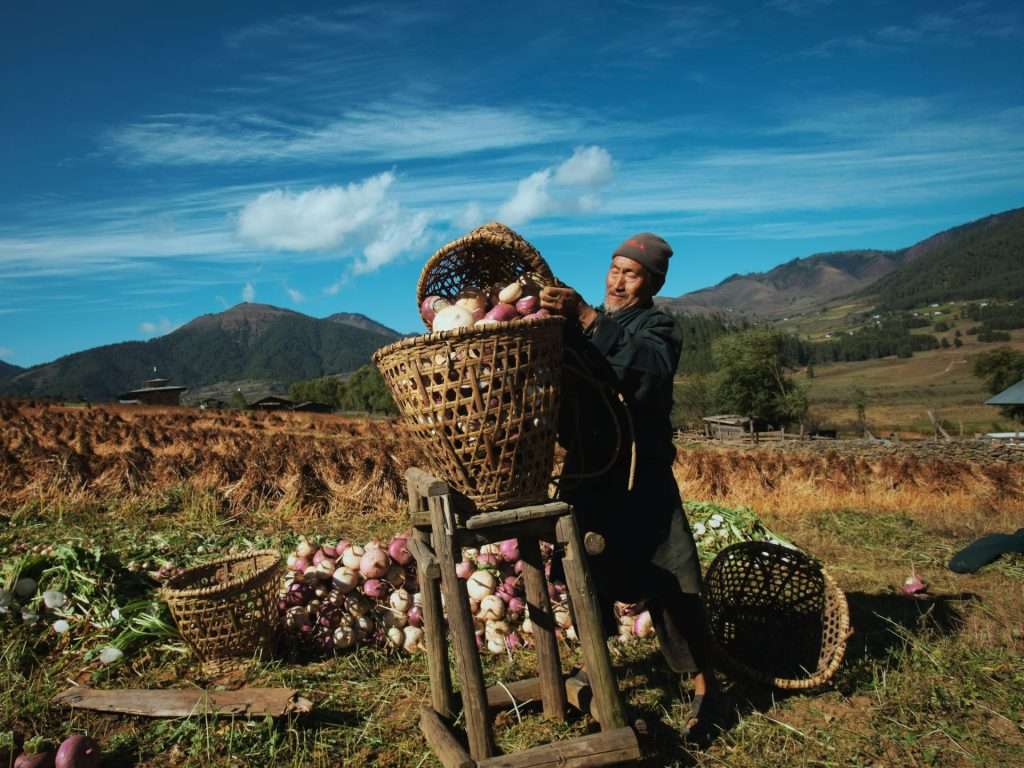Are the Bhutanese truly among the happiest people in the world? If so, what is their secret to happiness amidst the challenges of modernization and external influences? How has Bhutan, a small kingdom nestled in the Himalayas between two densely populated giants, preserved its cultural heritage, upheld traditional social structures, and safeguarded its pristine environment?
Perhaps the answer lies in the timeless ways of Bhutanese life. In stark contrast to bustling cities elsewhere, Thimphu’s shops open leisurely after 10 AM, reflecting a relaxed pace. Crime rates are minimal, with free public health and education fostering communal values. Buddhism, particularly Vajrayana Buddhism, shapes Bhutanese culture profoundly, evident in the numerous monasteries and temples dotting the landscape. Prayer flags flutter on windy hills, carrying mantras of compassion.
Central to Bhutanese beliefs are rebirth and karma, where actions shape current and future existence. This philosophy fosters mindfulness and contentment, encouraging merit over material wealth. It also nurtures compassion for all beings, rooted in the belief that all have been connected through past lives.
In essence, Bhutan’s happiness may stem from its harmonious blend of spiritual richness, cultural preservation, and environmental stewardship—a testament to its enduring allure and serenity amid a rapidly changing world.
FOOD FOR THE SOUL
Bhutanese cuisine is centered around rice, with both red and white varieties serving as staples. Buckwheat and corn are also cultivated and play a significant role in many Bhutanese dishes. Meals typically feature rice accompanied by curries made from meat or vegetables. Chilli is integral to Bhutanese cooking, used not just as a spice but as a key ingredient. Ema datshi, Bhutan’s national dish, exemplifies this with its spicy blend of chilli and cheese, beloved by locals and visitors alike. Momo, a popular snack, consists of stuffed dumplings found in numerous “momo-corners” across Bhutanese towns, where creative variations like ema datshi momo are also offered.
Bhutanese culture is vibrant and festive, steeped in Buddhist traditions. Festivals and ceremonies dot the calendar, honoring revered religious figures. The annual tshechu, celebrated on the 10th day of various lunar months across districts, stands as the most renowned festival. Each district holds its own tshechu on distinct dates. New Year celebrations follow the lunar calendar, with western Bhutan marking winter solstice as their new year. The Drukyul’s Literature Festival, hosted by Bhutan Echoes, showcases international literary talent, enriching Bhutan’s cultural landscape. Traditional music, dance, and spirited gatherings, often accompanied by local alcohol, enrich these festivities, embedding Bhutanese values and wisdom in every note and step.
STRONG FAMILY AND COMMUNITY TIES
In Bhutanese households today, the traditional setting of multiple generations living together is becoming less common, with young people increasingly migrating to urban areas and forming nuclear families. Marriage, traditionally a private affair, typically involved a couple moving in together, after which the community would recognize them as married. Legal formalities often followed after the birth of a child. However, modern trends are shifting, with more couples opting to cohabit before formalizing their union. This change is reflected in the evolving nature of marriage ceremonies, now elaborate affairs complete with Instagram-worthy moments, compared to the simpler family celebrations of the past. Interestingly, Bhutanese law permits individuals to legally marry up to three times, emphasizing the cultural significance placed on marriage.
Sustainability is deeply ingrained in the daily lives of Bhutanese people, extending from recycling plastic containers at home to the cherished practice of passing down handwoven textiles like kiras and ghos across generations. These textiles are often repurposed into mat covers and foot mats rather than discarded, reflecting a commitment to preserving cultural heritage and the environment. This dedication to environmental stewardship is also rooted in spiritual beliefs, as Bhutanese culture reveres natural features such as mountains, rivers, and ancient trees, believed to be inhabited by spirits and deities. Bhutan’s rich biodiversity, including endangered species and glacial lakes, underscores the country’s vulnerability to climate change, posing significant challenges to its mountainous ecosystems and the livelihoods of its people.
A LAND OF MYTHS
Bhutan is a land rich with tales and superstitions, where omens hold sway. It’s believed one shouldn’t start a new job, move to a new house, or begin a business venture on an inauspicious day. Feeling suddenly unwell? It might be a spirit’s glance—quickly light incense to appease it. Look around and you might spot small bamboo structures adorned with rainbow-colored threads known as dzoe, spirit catchers adorned with religious offerings, though a challenge for waste management!
Bhutan stands unique in many ways, notably in the significant equality and freedom enjoyed by women compared to other South Asian nations. Inheritance of property often passes to daughters rather than sons.
A palpable spiritual energy infuses Bhutan, evident in its untouched landscapes and deep religious faith. These create ideal settings for wellness and spiritual retreats, where meditation and mindfulness thrive as core Buddhist practices gaining global recognition for their mental health benefits. Many Bhutanese hotels offer wellness services blending spa treatments with traditional healing techniques.
Locals are passionate about archery, Bhutan’s national sport, along with football and futsal. In Thimphu, come evening, the city hums with activity—whether grocery shopping, heading home, or gathering at futsal courts and archery grounds.
Bhutan is truly a destination unlike any other, where visitors are encouraged to disconnect, unwind, and find renewal. Stepping into this kingdom, time seems to slow down, inviting a profound journey of exploration and rejuvenation.

